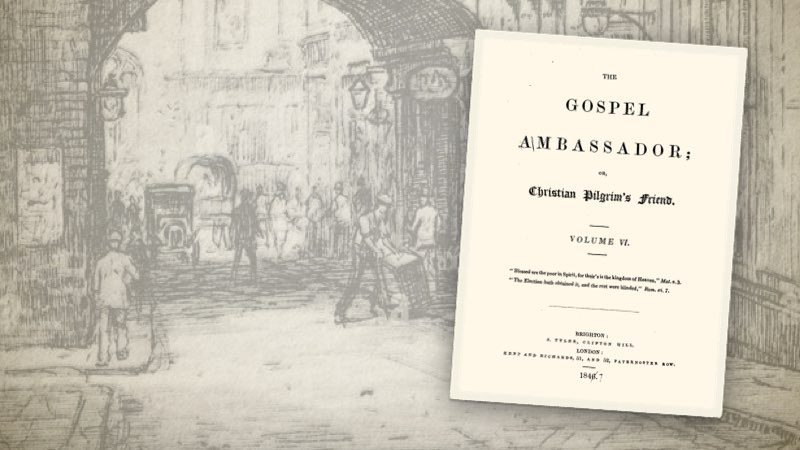
On Faith
The Gospel Ambassador 1847:
As faith is no way to be understood so well as by its effect, we cannot do better than trace it in its operations, for as it is a divine principle, emanating from God and taking possession of his beloved family, disposing them to love and serve God with all their hearts and souls, working in them both to will and to do of His own good pleasure; so it is a grace that human reason can never comprehend, nor fallen nature submit to, nor the will of man embrace, as this faith is the gift of God, Eph. 2:6, and without it it is impossible to please God, for what is not of faith is sin. Thus it appears that without this divine principle we must all live and die without God and without hope in this world, and consequently be condemned as unbelievers; who then in their right minds would not be concerned to know who whether they are entrusted in this first leading and important principle of grace? seeing that without this there can be no other grace possessed; this grace is the first evidence of divine life, the source from whence springs every acceptable work. And there is blessing attached to it, such a blessing as, “Blessed is he that believeth, for there shall be a performance of those things spoken of the Lord.”
First, This grace is an active principle and embraceth with delight the glorious object presented, even Christ Jesus the Son of God, as the sure and only friend of sinners: this principle is an holy one, and is called a treasure; yea, it is the evidence of Christ formed in you, the hope of glory, aye, it is the very life of God in the soul, and never fails to bring the soul it possesseth, sooner or later, to the footstool of divine mercy, imploring acceptance through Jesus. This faith makes and leaves a divine impression on the mind of the certainty of death and the uncertainty of life, the awfulness of sin and consequent condemnation, with a feeling necessity of salvation, and an earnest inquiry and constant search, with a full determination newer to give up the pursuit or to let God go, without a blessing.
Secondly, This faith renounceth all human performances, and pleadeth the oath and promises of God, and approacheth Christ as the chiefest of sinners, and pleads nothing but the atonement of Christ for acceptance before God, and his own need as the only condition between God and himself; and thus true faith will teach the sinner to approach Jehovah with humble boldness in the following language, “Lord, hast thou not said that thou wilt save to the very uttermost every sinner that cometh to thee by Jesus Christ? and I acknowledge my delay and utter unworthiness, but I plead thy promise of casting out none, and thou canst not display thy attribute of mercy to one more needy or undeserving, or one that would more gladly praise thee for it.” Therefore if it can be consistent with thy holiness to dispense pardon unto such an obstinate and unworthy wretch as I, O God, be merciful to me a sinner, and remember me with that favour thou bearest to thy people.
Thirdly, This faith lives upon the promise of God, waits deliverance and an answer from God; it is called the faith of God’s elect, because it is bestowed upon none but them, and it acts in the intermediate space between them and God, it is the coin of the heavenly kingdom that the elect trade with; by this they buy the truth and sell it not, and even to be reproached for this they account greater riches than all the treasures of Egypt.
Fourthly, This faith is the Christian’s light and guide in darkness, by this he can see through the darkest dispensations, it is his defense in danger, his support in weakness, his victory over his enemies; by this he holds communion with God and enters into fellowship with the saints, renounceth the devil, rejoiceth in times of trouble; by this he sees the world a delusion, and renounceth her charms, and rejoiceth in Christ Jesus, having no confidence in the flesh. By this divine grace he views death a friendly messenger, the grave a welcome place of rest, and the devil a conquered enemy, and Christ the captain of his salvation; by this he dwells upon the invisibilities of Jehovah, and views him on his right hand, and rests secure upon these everlasting arms; by this he runs through a troop, jumps over a wall, waxes valiant in fight, puts to flight the armies of the aliens. This faith goes out in search of the blessings promised, fully relying on the faithfulness of the promises, and rests assured that though the blessing may seem to tarry, yet it will come in due time and not tarry, and accounts every thing but dung and dross, compared with the excellency of Christ, and is willing to lose all things, rather than his communion with Christ, therefore his first desire is that he may win Christ and be found in him, adorned with his righteousness; by this faith Abraham went out not knowing whither he went, but left his native land; and Moses left the court of Pharoah, choosing rather to suffer affliction with the people of God, than to enjoy all the pleasures and profit of the Egyptian court, and to follow the low capacity of a shepherd rather than be called the son of Pharoah’s daughter. Yes, this special grace, under divine operation, dissolves doubts, endures seeing him that is invisible; by this faith Jehosaphat dug the valley full of ditches, when there was no appearance of wind, or rain, or fountain to supply, but the ditches were all filled with water at the appointed time, according to promise. And so shall it be done at all times to the persons whom the king delighteth to honour; thus those that rest in faith have always found even as the Lord hath told them. May it be our happy lot then to feel this spirit of faith and obedience, that in like manner we may meet the approbation of the Lord.
John Corbitt
It may be argued the Strict and Particular Baptist churches of the 17th, 18th and early 19th centuries were at their strongest when they remained independent congregations, unaffiliated with Magazines and Societies. This strength was lost during the latter half of the 19th century when the churches clamored around favorite periodicals and regional associations. Although the Magazines were largely responsible for creating a party-spirit and culpable for stirring up needless controversy, they nevertheless contain many valuable resources which may prove a blessing for this generation. Although they differed on various points of doctrine, they invariably held to high views of sovereign grace, denouncing as heresy the pernicious teachings of Andrew Fuller. The majority of Strict and Particular Baptist churches during the 18th and 19th centuries were Hyper-Calvinists.




